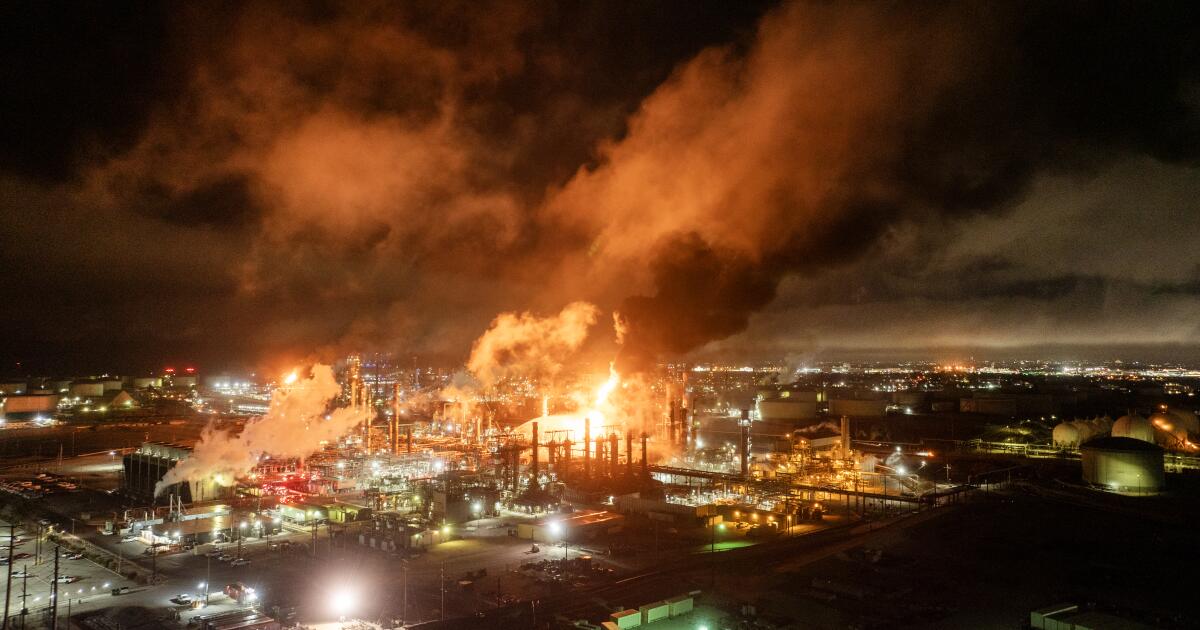To the editor: I’m a third-generation South Bay resident. My father was raised in El Segundo. His father worked for Standard Oil for years, and my father and my uncles worked summer jobs at the refinery. Standard Oil, now Chevron, seemed to have been a responsible community member.
I grew up a block from Standard Oil’s Rosecrans Ave. boundary. One of my earlier childhood memories was the time lightning struck an oil storage tank across Rosecrans. That fire burnt for days, the burning tank spewing black, sooty smoke.
How much lung damage did that cause to residents, particularly children and the elderly? But not many questioned the harm to the community Standard Oil might have been causing in the 1960s.
However, last week, as we heard, felt and saw what seemed to be a terrifying precursor to the apocalypse from our house seven blocks away, the question of possible harm and risk from a major oil producer nestled between residential communities and Los Angeles International Airport became more urgent (“‘I thought we got nuked or something.’ Massive explosion, fire rocks El Segundo refinery,” Oct. 3). We were fortunate the winds were mild and blowing off the ocean, as I fear what might have happened if the winds were out of the east.
However, after reading a Los Angeles Times article about the explosion that listed the many infractions by Chevron that our communities have been exposed to over recent years (“Chevron’s El Segundo refinery has a history of safety and environmental violations,” Oct. 4), I question the safety of allowing major refineries to remain in highly populated areas, especially when it seems the refineries get very little more than a slap on the wrist despite potential dangers of the incidents.
This is not a political issue. This is an issue of the health and safety of the surrounding population. Refineries, or other dangerous industries, should not be able to operate in a way that may cause harm to others.
Hard questions as to the cause and fixes need to be asked. If the federal government dodges this central duty, the state must step in. Refineries should not get a blank check.
Kathryn Gray, Manhattan Beach
..
To the editor: While the strictest safety protocols are of course a must, we residents of El Segundo and Manhattan Beach just have to live with the fact that a fuel refinery is a volatile place that even the most intricate regulations can’t completely mitigate (“El Segundo was born by oil. The massive refinery fire leaves residents rattled,” Oct. 3).
As a longtime resident of Manhattan Beach who lives about half a mile from the refinery, I still remember what happened in September of 1968. Lightning struck a large surface oil storage tank at the facility (then Standard Oil), causing the oil to ignite in an explosion and fire. Firefighters used water and foam to no avail, so they just decided to let it burn itself out. The burnout lasted 13 days, during which night was turned into day by the high flames and day was turned into night by the thick black smoke.
This was a freak act of nature that no safety rules could have prevented. For us living nearby the refinery, it’s part of the deal, but I would never want to live anywhere else.
Pete Skacan, Manhattan Beach
..
To the editor: If state lawmakers needed a sign that their bill boosting oil drilling to appease refineries was ill-advised, they got it last Thursday night in the form of towering flames.
The blast and inferno was at least the fifth fire at Chevron’s El Segundo refinery since 2016, part of a long history of refinery incidents in California.
Communities know this all too well, but lawmakers seem to have forgotten that entrenching oil and gas production is disastrous for people’s health, the environment and the economy. Even as air quality officials reported spikes of dangerous chemicals from the fire, economists warned it would spike gas prices.
Every time our leaders cave to the volatile, hazardous fossil fuel industry, Californians suffer for it. It’s time to speed the transition to clean energy and get off oil and gas for good.
Christina Scaringe, Sacramento
This writer is California climate policy director at the Center for Biological Diversity.
..
To the editor: I grew up in Manhattan Beach in the 1950s. I lived just a few miles from the Chevron refinery in El Segundo. Even then, our nickname for El Segundo was “El Stinko.” Over the years, they had a few big fires and lots of bad odors. Unfortunately, nothing new here.
Mike Reardon, Fallbrook

